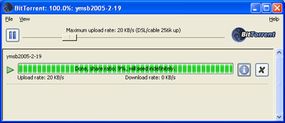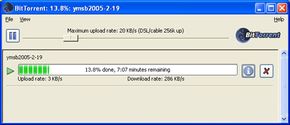Finding and Downloading Torrent Files
After you set up your computer, you're ready to download .torrent files. You can search for the term ".torrent" using an Internet search engine to find sites that offer BitTorrent files. There are also a number of sites dedicated to BitTorrent file searching. These include isoHunt and TorrentSpy. Other sites that offer BitTorrent files directly include bt.etree.org for shareable music, Legal Torrents for music, videos and books, and BT on EFnet for recent television shows.
When you find the file you want, right-click the .torrent link, choose "save target as" and save the file in a convenient place on your computer, such as the Windows desktop. The .torrent file, which is a pointer to the actual file you want, will download quickly. Next, double-click the .torrent file you saved to your computer. The BitTorrent client software displays and starts the download process:
Advertisement
As we mentioned before, the more computers in the sending/receiving swarm, the quicker the download process. If you are downloading a file with only a few other computers in the swarm, the transfer speed will be relatively slow.
After the download is complete, leave the BitTorrent client software open so that other peers can download .torrent files from your computer.*

Peers using BitTorrent can download only .torrent files from your computer. Once you have a complete copy of a file, your computer becomes a potential seed for that file -- as long as you're still running the software. Sharing what you have causes speedier BitTorrent downloads for you in the future. You can leave the client software running for a few hours or overnight.* Simply close the software when you're done.
Legal Ramifications Similar to other peer-to-peer software, BitTorrent can be used to download copyrighted material. Because BitTorrent handles large files remarkably well, it is especially popular for downloading video files. The Motion Picture Association of America has filed countless lawsuits, causing at least many high-traffic .torrent download sites to shut down.
BitTorrent itself is perfectly legal to use. When you select a file to download, however, it is your responsibility to make sure the file not copyrighted. BitTorrent downloads are not anonymous information about your computer's IP address and the files you download can be traced back to you.
Despite its improper use by distributors of copyrighted material, the BitTorrent program itself both legal and innovative. With additions such as tit-for-tat and an open-source philosophy, BitTorrent will likely build a legacy of its own while serving as a bridge to the next generation of file-serving software.
For more information on BitTorrent and related topics, check out the links below.
Related HowStuffWorks Articles
More Great Links
Sources
- Bram Cohen's BitTorrent Site http://www.bittorrent.com
- Brian's BitTorrent FAQ and Guide http://dessent.net/btfaq/
- How Gnutella Works
- BitTorrent Tweaks http://userpages.umbc.edu/~hamilton/btclientconfig.html
- etree http://bt.etree.org
- BitTorrent 101, About.com. http://netforbeginners.about.com/od/peersharing/a/torrenthandbook.htm
- "File Sharing's New Face." The New York Times, February 12, 2004.
- "The BitTorrent Effect." Wired Magazine, January 2005.
